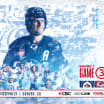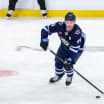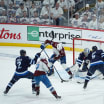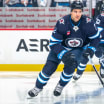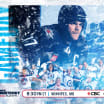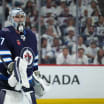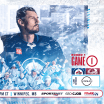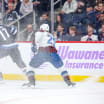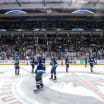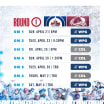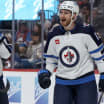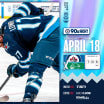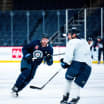A lot can happen in an 82-game regular season.
Scoring streaks and slumps, winning streaks and losing streaks, tough losses and memorable wins, all culminate in a race for the opportunity to play for the Stanley Cup.
It can be a lot to handle. NHL veterans learn to handle those ups and downs, but they also play a crucial role in helping younger players develop and learn to keep a level head through it all.
Role Models
Mark Scheifele and Jacob Trouba elaborate on who helped them adjust to the NHL
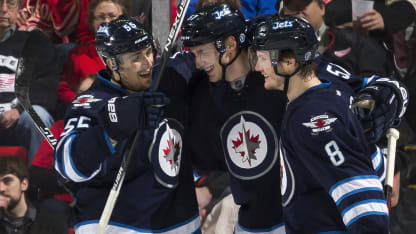
© Dave Reginek/Getty Images
Case in point - Mark Scheifele, the 7th overall pick of the Winnipeg Jets in 2011. As the first player selected by the franchise in the NHL Draft since the relocation from Atlanta to Winnipeg, his development and transition to the NHL has been followed closely.
Who better to lean on for support during that time, than captain and two-time Stanley Cup champion, Andrew Ladd.
"Laddy is the guy that I looked up to a lot since my first year, since I was 18-years-old," said Scheifele, now 22. "He was the guy I always went to talk to and talk with. He always gave me little tidbits about how not to get down on yourself, how not to get frustrated."
Scheifele could have been frustrated. He started the regular season with the Jets in 2011-2012 and 2012-2013 before being sent back to the OHL's Barrie Colts.
But the forward stuck with it. Now, in his third full season, not only is he a playmaker with a wicked wrist shot in the offensive zone, he's also responsible in the defensive zone.
Not only that, but the pupil has become the teacher. Scheifele routinely talks to 19-year-old NHL rookie Nikolaj Ehlers about the very same lessons he's learned from Ladd.
"I've talked to him a bunch already. All he wants to do is learn. He's a curious kid and that's awesome," Scheifele said of Ehlers. "The biggest thing for me that I'm trying to help him with is to not get frustrated. Continue to round out his game, be good defensively. Know that if you play well defensively, with his speed he's going to get offensive chances.
"He's a great kid and it's awesome to teach him. I just want to continue to help him as much as I can."
Scheifele's help, along with the talents of line mate Blake Wheeler, propelled Ehlers to his first NHL hat trick Jan. 26 against Arizona. But it hasn't always been easy for the young Dane. After a quick start to his season, Ehlers went through a stretch of 25 games with three points.
"In the beginning it was hard. It's definitely a different type of game than the preseason," said Ehlers. "But I think I got used to it pretty well. There's still some things I can work on, but that's going to come with time. I feel pretty comfortable now."
Following two seasons with Halifax of the QMJHL where he accumulated 205 points in 114 games, Ehlers put pressure on himself to succeed in the NHL. Adding to that pressure? The 12,000+ followers Ehlers has on social media.
"Everything is new for all these players," said Jets head coach Paul Maurice. "I think a benefit to the kids that come in now, and there's a big bulk of really good young players that are having an impact in the league, this may be the one positive part of social media, they've grown up with it, they've been exposed to it.
"They've had a lot of people from the outside telling them how fantastic they are for a number of years. He's learned to handle that."
Maurice has seen a change in the game in recent years that have allowed younger players with Ehlers' stature (6'0", 175 pounds) and skill to thrive. He often thinks back to when Joe Thornton began his career in Boston playing on the fourth line. It was thought then that Thornton, at 200 pounds, wasn't strong enough yet.
"We're seeing, every year it seems like, more incredibly talented young men come in and are able to put up numbers. I think the game has changed in a way that allows a guy that hasn't grown into his body yet to still produce," said Maurice. "That change in 2006 to the style of game, has allowed good young players to come in and be skilled."
Ehlers isn't the only rookie learning the game this season. Andrew Copp, fresh off wearing the captain's 'C' at the University of Michigan, continues to grow as a young centre.
"He's a very smart kid. So he's picked up all the defensive responsibilities, (and) his face offs have improved," said Maurice. "With everybody healthy, I've played the fourth line a whole lot more than I did last year at any point just because I have confidence in him, and he's just going to keep getting better."
Copp's former team mate, and childhood friend Jacob Trouba, said living with former Jets defenceman Zach Bogosian helped him adjust to life as a pro off the ice. He mentions both Bogosian and veteran Mark Stuart as key players in helping him learn the pro game on the ice.
"I think (Stuart) helped me early on with learning other players. We'd kind of go through the line-up before every game, and just give me some tips and pointers," said Trouba. "As you get older in the league, you start learning more about other players you're playing against and that makes it a little easier."
Of course, things are slightly different for Trouba on defence. Like Scheifele though, Trouba is in his third full season in the NHL, and has experienced everything from playoffs to injuries during that time.
Assistant coach Charlie Huddy, a five-time Stanley Cup champion in his own right, says young defencemen like Trouba go through a steep learning curve.
"I think most of it is just positioning in your own end. That's the hardest part of the game for young defencemen to get sorted out. Things happen real quick down there," said Huddy. "There's a lot of interchanges and a lot of motion down there so I think getting things sorted out in your own end, who the right guy to pick up, and who the right guy is to take to the net or whatever the case may be, or pressure the puck at the right time."
As time passes, players like Trouba, Copp, Scheifele, Ehlers, as well as Adam Lowry, Connor Hellebuyck, Joel Armia, and more will continue to write chapters in the stories of their careers.
They can't be written all at once though. No, those chapters get written one game at a time.
"You keep on gaining experience as the years go on. I think that's the biggest thing. You learn the game, you learn how it's played, you learn how the game ebbs and flows," said Scheifele. "Games change so much. You're going to have good shifts, you're going to have bad shifts, you're going to have bad games and you're going to have good games… (just) keep moving on to the next shift, and keep on doing your thing."

